|
|
|
Sort Order |
|
|
|
Items / Page
|
|
|
|
|
|
|
| Srl | Item |
| 1 |
ID:
139658
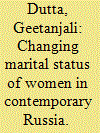

|
|
|
|
|
| Summary/Abstract |
Throughout the world, marriage is a complex phenomenon in a state of constant flux and not limited to its legal connotations. Geetanjali Dutta asserts that demographic statistics in Russia suggest considerable changes in behaviour and attitude with falling rates of registered marriages, more unmarried couples living together and an increasing number of children born out of wedlock.
|
|
|
|
|
|
|
|
|
|
|
|
|
|
|
|
| 2 |
ID:
190463


|
|
|
|
|
| Summary/Abstract |
This essay explores the changing shape of transitions from education to employment amongst deaf and hard-of-hearing (DHOH) youth in Russia. It draws on survey and interview data to show that, despite the formal institution of inclusive policies and legal frameworks at the state level, the choices open to DHOH youth remain heavily limited, and become narrower at each stage of their transitions to adulthood. This narrowing of horizons and attendant marginalisation stems from the ongoing salience of disabling, medical approaches to deafness; a lack of enabling practices or resources to support DHOH youth in the education system; and widespread discrimination from employers.
|
|
|
|
|
|
|
|
|
|
|
|
|
|
|
|
| 3 |
ID:
182028


|
|
|
|
|
| Summary/Abstract |
In the 21st century, positions of Russia in the world have essentially strengthened. It seems that this country has finally overcome all cataclysms of the end of the 20st century and became a great power again. However, the revival of Russia as a great power is an illusion rather than a reality. Contemporary Russia is characterized by numerous geopolitical contradictions. These contradictions are caused by both historical factors and Putin’s revanchist, imperialist policy. There are many parallels between contemporary Russia and the late USSR. The author concludes that Russia is close to imperial overstretch and will soon collapse.
|
|
|
|
|
|
|
|
|
|
|
|
|
|
|
|
| 4 |
ID:
142676


|
|
|
|
|
| Summary/Abstract |
This essay discusses the medicalisation of contraception by gynaecologists in present-day Russia. I explore the disciplining discourse and tactics of gynaecologists as experts who aim to orient women towards properly planned and prepared pregnancy. Gynaecologists are important agents of reproductive control because they instruct women in detail about reproductive health and contraception. However, these disciplining medical discourses and professional practices are characterised by inconsistency. In accordance with the demographic priorities of the state, doctors are more oriented towards pregnancy treatment than consultation on contraception, and they are inconsistent in their regulation of contraceptive use. This biopolitical regime reflects the demographic priorities of the Russian state—to increase the population of Russia—and the role of women as the primary objects of this policy.
|
|
|
|
|
|
|
|
|
|
|
|
|
|
|
|
| 5 |
ID:
140583
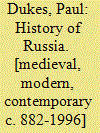

|
|
|
|
|
| Edition |
3rd ed.
|
| Publication |
London, Macmillan Press Ltd., 1998.
|
| Description |
xiv, 430p.hbk
|
| Standard Number |
0333660668
|
|
|
|
|
|
|
|
|
|
|
|
Copies: C:1/I:0,R:0,Q:0
Circulation
| Accession# | Call# | Current Location | Status | Policy | Location |
| 039496 | 947/DUK 039496 | Main | On Shelf | General | |
|
|
|
|
| 6 |
ID:
104189


|
|
|
|
|
| Publication |
2011.
|
| Summary/Abstract |
THE EMERGENCE OF LOCAL REGIMES,1
OR RELATIVELY stable patterns of subnational
governance, became an important logical consequence of the
turbulent political and economic changes in Russia's regions and cities during
the periods of the 1990s and the 2000s. We posit that these developments could be
analysed within the theoretical framework of 'urban regimes', which have been
conducted in studies of American and West European urban politics and
governance over the two last decades (Mossberger & Stoker 2001; Ledyaev
2008). Despite the major differences which exist between local regimes in
contemporary Russia and in the West, and their highly divergent political and
institutional environments, the placement of Russian local regimes within a
theoretical and comparative perspective opens new horizons for their analysis. It
also provides us with a better understanding of their general trends as well as some
of their peculiarities
|
|
|
|
|
|
|
|
|
|
|
|
|
|
|
|
| 7 |
ID:
142679


|
|
|
|
|
| Summary/Abstract |
The liberation of the family from the excessive control of the state, support of children’s moral values, the improvement of childcare, and overcoming the demographic crisis have all influenced recent discussions on preschool education and care in Russia. The essay analyses how different, and often conflicting, formulations of ‘public interests’ influenced preschool institutions in Russia during the last 25 years. The essay also seeks to explore contemporary evaluations of preschools in the context of the interpretations offered by public discussions and parents of the Soviet practice of childcare.
|
|
|
|
|
|
|
|
|
|
|
|
|
|
|
|
| 8 |
ID:
188770


|
|
|
|
|
| Summary/Abstract |
This article contributes to the research of nation-building in modern Russia. Unlike most studies in this area, based on the ethnic/civic dichotomy or using the nation/empire dilemma, the rticle proposes a discursive model of nation-building in Russia, based on the interaction of four types of nationalism: civic, multicultural, imperial and civilizational. The results of content analysis of key political documents on nation-building in modern Russia (Strategies of the state national policy, presidential addresses, Vladimir Putin’s articles) are presented and discussed. It is shown that civic nationalism with rhetorical references to civil society and its ability to build a nation from below is the most supported by the elite type of discourse on nation-building. However, in practice policy preference is given to the hegemonic state model of nation-building from “top to bottom,” dominated by a carefully veiled imperial discourse.
|
|
|
|
|
|
|
|
|
|
|
|
|
|
|
|
| 9 |
ID:
161370


|
|
|
|
|
| Summary/Abstract |
Since 2010, religious organisations in the Russian Federation have been legally empowered to claim back property confiscated by the state after the October Revolution in 1917. The restitution of church buildings, however, provokes competing claims from different religious and non-religious organisations. Nevertheless, the Russian Orthodox Church has been able to reclaim most of these buildings. This article draws attention to the increase in the power of the Russian Orthodox Church, characterising the interplay between religion and politics in Russia as ‘entangled authorities’. Outcomes of restitution claims are hard to predict and depend on the local setting and the constellations of power.
|
|
|
|
|
|
|
|
|
|
|
|
|
|
|
|
| 10 |
ID:
132697
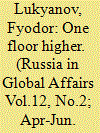

|
|
|
|
|
| Publication |
2014.
|
| Summary/Abstract |
It is already becoming habitual: yet another turn in world politics - and a fondly prepared portfolio of materials has to be shelved, and new ones made in an emergency mode. Witnessing epoch-making events is fascinating, but it takes a lot of nerve…
The period from February to April 2014 marked the sharpest turn in history since the end of the Cold War. We have witnessed the actual collapse of the Ukrainian statehood which emerged after the abolition of the Soviet Union, Crimea's entry into the Russian Federation, and an upsurge in confrontation between Moscow and the West. No wonder life made us revise our plans and devote the entire issue of Russia in Global Affairs to the changes which someone has already dubbed "Russian spring."
|
|
|
|
|
|
|
|
|
|
|
|
|
|
|
|
| 11 |
ID:
128247
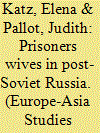

|
|
|
|
|
| Publication |
2014.
|
| Summary/Abstract |
The identity of a prisoner's wife is often a shameful societal stigma. Yet Russia's unique history of imprisonment has provided an unusually positive trope for women who have to come to terms with their partners' incarceration: the 'Decembrist wife' (dekabristka). This trope originated in the aftermath of the 1825 'Decembrist' uprising-the first anti-monarchist revolt in modern Russian history. A handful of wives of the perpetrators voluntarily joined their husbands in Siberian exile and, in leaving behind families and comforts, created a precedent to be glorified for future generations. Upheld in Russian national mythology as a model of the exemplary wife, the dekabristka identity lives on. This paper examines its enduring power and significance in contemporary Russia
|
|
|
|
|
|
|
|
|
|
|
|
|
|
|
|
| 12 |
ID:
155596


|
|
|
|
|
| Summary/Abstract |
What is the nature of religion and state relations in authoritarian regimes? How do religious and regime actors negotiate the terms of their relationship;what do the two sides want from one another; and how cooperative or conflictual are their interactions? To address these questions, the author compares religion-regime relations in contemporary Russia and China—two autocracies with long histories of religious repression, diverse religious profiles, and distinct relations between religion and the state. The article introduces a new theoretical framework anchored in interests and subnational authoritarian politics to explain how religious and political authorities negotiate their relationship and the constraints and opportunities that shape their interaction. Although there are many reasons to expect different types of religion-regime relations across Russia and China, the data demonstrate that subnational governments and diverse religious actors often forge innovative partnerships to govern more efficiently, gain access to resources, and safeguard their survival.
|
|
|
|
|
|
|
|
|
|
|
|
|
|
|
|
| 13 |
ID:
172861


|
|
|
|
|
| Summary/Abstract |
This article is about a cultural-philosophical movement called Russian cosmism (Russky kosmizm) and its current status in the Republic of Kalmykia, southwest Russia, home to Buddhist Kalmyks, a people of Oirat-Mongol origin. Emerging in Russia in the early twentieth century and suppressed during the Soviet period, this movement proliferated openly across Russia with the beginning of perestroika. Promulgated as an original product of the Russian mind, cosmism positions itself as a ‘science of the truth and soul searching’ and purports to address various issues, including—but not limited to—the spiritual, psychic, and paranormal anxieties that are on the rise in Russia. Although Russian cosmism is an all-encompassing movement combining various elements of theosophy, philosophy, poetry, theories of evolution and energy, astrology, cosmology, ecology, and even science fiction, this article focuses upon its more cosmic topics—that is, those that are related to outer space, cosmic energies, and alien visitations, as well as responses to these ideas in Kalmykia. The story of Russian cosmism is not just a story of this particular movement, but also that of science in Russia.
|
|
|
|
|
|
|
|
|
|
|
|
|
|
|
|
| 14 |
ID:
132103
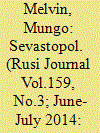

|
|
|
|
|
| Publication |
2014.
|
| Summary/Abstract |
Many saw Russia's annexation of Crimea in March 2014 as a throwback not only to the Cold War, but to earlier memories of Russian imperialist aggression. In such a heated climate, it is essential to understand not only the strategic calculations of contemporary Russia but also its historical, cultural and emotional links to a region that has, for centuries, been at the heart of Russian national identity. Mungo Melvin brings to life this longstanding relationship in a historical, literary and military journey through the birth and struggles of Sevastopol, Crimea's iconic citadel on the Black Sea shores.
|
|
|
|
|
|
|
|
|
|
|
|
|
|
|
|
| 15 |
ID:
131788
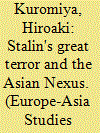

|
|
|
|
|
| Publication |
2014.
|
| Summary/Abstract |
Stalin's Great Terror of 1937-1938 did not stop at the Soviet borders: under Moscow's explicit instructions, it extended to Asia, particularly to the People's Republic of Mongolia and to Xinjiang or Chinese Turkestan. More people proportionately suffered from the Terror in Mongolia than in the Soviet Union. Stalin's terror operations in the Asiatic lands were implicitly directed against Japan, the main competitor for influence in the region.
|
|
|
|
|
|
|
|
|
|
|
|
|
|
|
|
| 16 |
ID:
154366
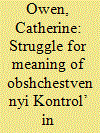

|
|
|
|
|
| Summary/Abstract |
This article explores contrasting conceptions of the essentially contested concept obshchestvennyi kontrol’, as understood by the anti-systemic opposition and the Kremlin. It shows that the period of contention accompanying the 2011–2012 elections allowed competing narratives of this concept to emerge. First, the opposition presented it as a means for citizens to hold corrupt authorities accountable to the law; second, the Kremlin promoted it as a means to enhance government efficiency. The article shows that the Kremlin has co-opted the counter-hegemonic discourse into a new law which delimits the possibilities for enacting this concept in a fashion that recalls Soviet governance practices.
|
|
|
|
|
|
|
|
|
|
|
|
|
|
|
|
| 17 |
ID:
132088
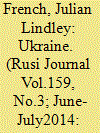

|
|
|
|
|
| Publication |
2014.
|
| Summary/Abstract |
As NATO prepares for the Wales Summit in September, the crisis in Ukraine and the resultant tensions with Russia have changed the geostrategic context in which the Alliance operates. Julian Lindley-French steps into the Russian mindset to analyse the motivations behind the country's assertive behaviour, and argues that it is vital that the West does the same.
|
|
|
|
|
|
|
|
|
|
|
|
|
|
|
|
|
|
|
|
|